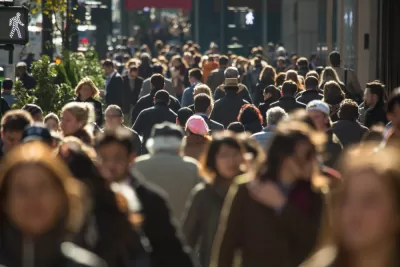Cities, which have demonstrated vulnerability to hacks, present a threat to personal privacy. Experts propose solutions to a growing problem.

When cities track their citizens transit, video tape their movements, and document their involvement in criminal cases, they collect data that could be sensitive or personally damaging. To protect their citizens, cities try to 'anonymize' their data, but according to Berkman Klein Center for Internet & Society that's easier to say than do. "Problematically, most privacy frameworks focus on 'identifying and removing personally identifiable information' — but because so much data is now available from so many sources, hackers (or others with ill intent) could potentially use a piecemeal approach to identify individuals, even if the data sets are made anonymous," reports Rachel Dovey in Next City.
The privacy issue is exacerbated as cities and private companies continue to collect more and more data, and the best practices around this kind of data collecting are evolving with the technology or in some cases, unknown to those doing the collecting. "'Today, data is plentiful but insight is far less common,' Jane Wiseman wrote for another paper on CDOs," Dovey reports.
FULL STORY: What Plugged-In Cities Mean for Personal Privacy

Alabama: Trump Terminates Settlements for Black Communities Harmed By Raw Sewage
Trump deemed the landmark civil rights agreement “illegal DEI and environmental justice policy.”

Planetizen Federal Action Tracker
A weekly monitor of how Trump’s orders and actions are impacting planners and planning in America.

The 120 Year Old Tiny Home Villages That Sheltered San Francisco’s Earthquake Refugees
More than a century ago, San Francisco mobilized to house thousands of residents displaced by the 1906 earthquake. Could their strategy offer a model for the present?

Rural Population Grew Again in 2024
Americans continued to move to smaller towns and cities, resulting in a fourth straight year of growth in rural areas.

Safe Streets Grants: What to Know
This year’s round of Safe Streets for All grant criteria come with some changes.

Rural Missouri Transit Service Could Lose State Funding
OATS Transit offers low-cost rides to primarily elderly rural residents with little or no access to other transportation options.
Urban Design for Planners 1: Software Tools
This six-course series explores essential urban design concepts using open source software and equips planners with the tools they need to participate fully in the urban design process.
Planning for Universal Design
Learn the tools for implementing Universal Design in planning regulations.
Clanton & Associates, Inc.
Jessamine County Fiscal Court
Institute for Housing and Urban Development Studies (IHS)
City of Grandview
Harvard GSD Executive Education
Toledo-Lucas County Plan Commissions
Salt Lake City
NYU Wagner Graduate School of Public Service



























